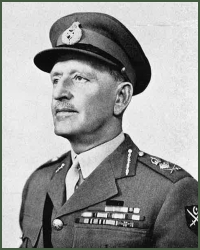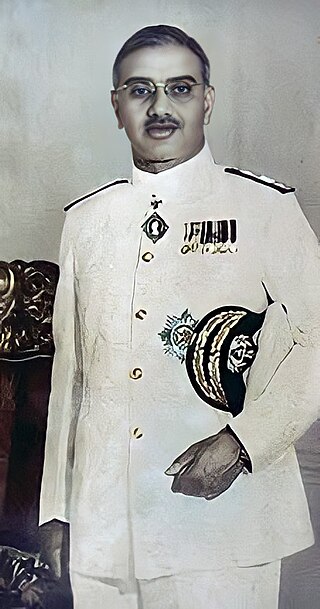Related Research Articles

General Sir Douglas David Gracey & Bar was a British Indian Army officer who fought in both the First and Second World Wars. He also fought in French Indochina and was the second Commander-in-Chief of the Pakistan Army. Gracey held this latter office from 11 February 1948 until his retirement on 16 January 1951. Born to English parents living in India, he was educated in English schools before returning to India to serve in the military there.

Vappala Pangunni Menon was an Indian civil servant who served as Secretary to the Government of India in the Ministry of the States, under Sardar Patel. By appointment from Viceroy and Governor-General of India Wavell, he also served as Secretary to the Governor-General (Public) and later as Secretary to the Cabinet. He also was the Constitutional Adviser and Political Reforms Commissioner to the last three successive Viceroys during British rule in India. In May 1948, at the initiative of V. P. Menon, a meeting was held in Delhi between the Rajpramukhs of the princely unions and the States Department, at the end of which the Rajpramukhs signed new Instruments of Accession which gave the Government of India the power to pass laws in respect of all matters that fell within the seventh schedule of the Government of India Act 1935.

Lieutenant-General Sir Archibald Edward Nye, was a senior British Army officer who served in both world wars. In the latter he served as Vice-Chief of the Imperial General Staff (VCIGS).

General Jayanto Nath Chaudhuri, was an Indian Army General Officer. He served as the 6th Chief of Army Staff from 1962 to 1966 and the Military Governor of Hyderabad State from 1948 to 1949. After his retirement from the Indian Army, he served as the Indian High Commissioner to Canada from 19 July 1966 until August 1969.

Sir Benegal Rama Rau CIE, ICS was the fourth Governor of the Reserve Bank of India from 1 July 1949 to 14 January 1957.
Sir Narayanan Raghavan Pillai, of Elenkath, KCIE, CBE, popularly known as "Rag", was an Indian civil servant. He served as the first Cabinet Secretary in independent India, 1950–1953, and as the second Secretary General in the Ministry of External Affairs, He also served as India's Ambassador to France.

Admiral Ram Dass Katari was an Indian Navy Admiral who served as the 3rd Chief of the Naval Staff (CNS) from 22 April 1958 to 4 June 1962. He was the first Indian to hold the office and succeeded the last British officer to the post, Vice Admiral Sir Stephen Hope Carlill.

Colonel Maharaja Raol Sir Krishna Kumarsinhji Bhavsinhji KCSI was an Indian king and politician, the last ruling Maharaja of the Gohil dynasty, who ruled Bhavnagar State from 1919 to 1948 and also served as the first Indian Governor of Madras from 1948 to 1952. After the handover of rule of the Bhavnagar State as part of the Indian Union, Bhavnagar became the first state which joined the Indian Union.
Cadambi Sheshachar Venkatachar was an Indian Civil Servant, diplomat and the second Chief Minister of Rajasthan.

Hubert Massey Whittell OBE was a British army officer, and later an Australian farmer and ornithologist who compiled a history and bibliography of ornithology in Australia from its origins until the mid-20th century.

Dewan Bahadur Ketolira Chengappa, C.I.E. (1878-1963) was an Indian civil servant and administrator who served as the Chief Commissioner of Coorg Province from 1943 to 1949.

Registrar General and Census Commissioner of India, founded in 1961 by the Government of India Ministry of Home Affairs, for arranging, conducting and analysing the results of the demographic surveys of India including Census of India and Linguistic Survey of India. The position of Registrar is usually held by a civil servant holding the rank of Joint Secretary.

Mary Clubwala Jadhav MBE (1909–1975) was an Indian philanthropist.

Diwan Bahadur Sir Narasimha Gopalaswami Ayyangar was an Indian civil servant and statesman, who served as the Prime Minister of the princely state of Jammu and Kashmir and later a minister in the first cabinet of independent India. He was a member of the drafting committee of the Constitution of India, the leader of the Rajya Sabha, a 'minister without portfolio' looking after Kashmir Affairs, and the Minister for Railways.

Sir Joseph William Bhore was an Indian civil servant and diwan of the Cochin State. He is best remembered for his chairmanship of the Health Survey and Development Committee that charted a course for public health investments and infrastructure in India.
Lieutenant-General Sir Harold Williams was an Irish-born British Army officer, engineer and mountaineer.
Sundaram Ayyar VenkateswaranCIE was a civil servant of the Indian Civil Service who served as Census Commissioner of Madras State during the 1951 census and the Chief Election Commissioner of Madras Presidency from 26 June 1948 to 22 August 1952. He also served as Commissioner of Land Revenue for Madras State and Vice-President of the Madras Music Academy.
Sir Christopher Hughes Masterman was a British civil servant and bureaucrat who served as Chief Secretary of the Madras Presidency from 1943 to 1947.
Sir Robert George Allan was a British agricultural administrator in British India.
Lieutenant-general Sir Ernest William Charles Bradfield was an English first-class cricketer and British Army officer. Graduating from St Mary's Hospital Medical School, he joined the Indian Medical Service in 1903 and would serve in campaigns in the North-West Frontier Province of British India and in the Mesopotamian campaign of the First World War. He would go onto hold a number of senior appointments within the Indian Medical Service, rising to the rank of lieutenant-general. Bradfield was noted as being infleuential in the establishment of the Indian Army Medical Corps during the Second World War. In addition to his lengthy and decorated military career, Bradfield also played first-class cricket on four occasions for the Europeans cricket team in India.
References
- 1 2 3 "In Memoriam". Himalayan Journal. The Himalayan Club (16). 1950.
- 1 2 Mitra, Asok (17–24 December 1994). "Census 1961: New Pathways". Economic and Political Weekly. 29 (51/52): 3207–3221. JSTOR 4402155.(subscription required)
- ↑ Desai, I. P. (2005). "Crime: Primitive Law and Some Social Anthropologists". In Chacko, Pariyaram Mathew (ed.). Tribal Communities and Social Change. SAGE. p. 162. ISBN 9780761933311.